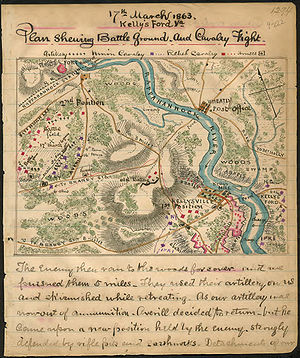Battle of Kelly's Ford
| Battle of Kelly's Ford | |||||||
|---|---|---|---|---|---|---|---|
| Part of the American Civil War | |||||||
 Plan showing battleground and cavalry fight, March 17, 1863, Kelly's Ford, Virginia. |
|||||||
|
|||||||
| Belligerents | |||||||
|
|
|
||||||
| Commanders and leaders | |||||||
| William W. Averell | Fitzhugh Lee | ||||||
| Strength | |||||||
| 2,100 | 800 | ||||||
| Casualties and losses | |||||||
| 78 total 6 killed 50 wounded 22 missing |
133 total 11 dead 88 wounded 34 captured |
||||||
The Battle of Kelly's Ford, also known as the Battle of Kellysville or Kelleysville, took place on March 17, 1863, in Culpeper County, Virginia, as part of the cavalry operations along the Rappahannock River during the American Civil War. It set the stage for Brandy Station and other cavalry actions of the Gettysburg Campaign that summer. Twenty-one hundred troopers of Brig. Gen. William W. Averell's Union cavalry division crossed the Rappahannock to attack the Confederate cavalry that had been harassing them that winter. Brig. Gen. Fitzhugh Lee counterattacked with a brigade of about 800 men. After achieving a localized success, Union forces withdrew under pressure in late afternoon, without destroying Lee's cavalry.
When Maj. Gen. Ambrose Burnside was relieved of command of the Union's Army of the Potomac (following the disastrous Battle of Fredericksburg in December 1862 and the fiasco of his Mud March in January 1863), his replacement, Maj. Gen. Joseph Hooker, immediately began reorganizing and training his army, in winter quarters outside of Fredericksburg. One of his most significant actions was to combine smaller cavalry units, spread out across the army, into a single Cavalry Corps, led by Maj. Gen. George Stoneman. Up until this time, the Union cavalry had been consistently outperformed by their Confederate counterparts, commanded by Maj. Gen. J.E.B. Stuart. Although they possessed superior equipment and had the advantage of a plentiful supply of men and federal horses, the Union cavalrymen had lacked the confidence, experience, and leadership to challenge Stuart.
...
Wikipedia
